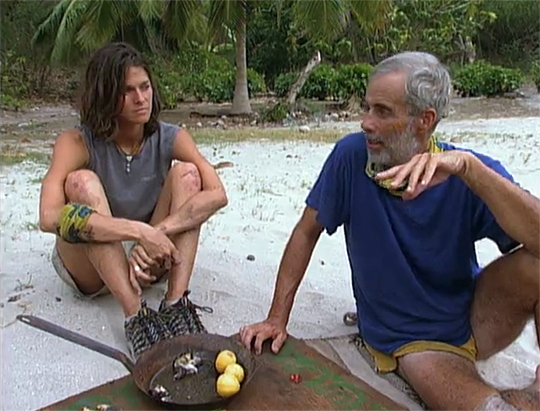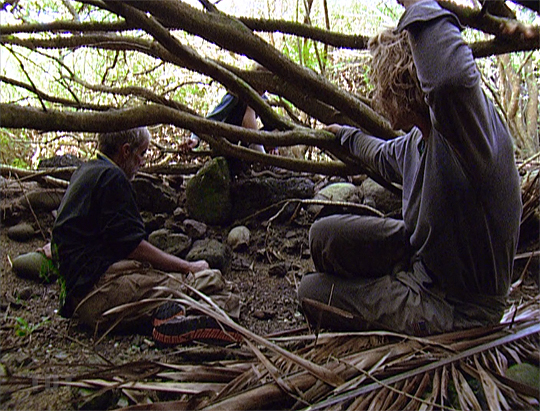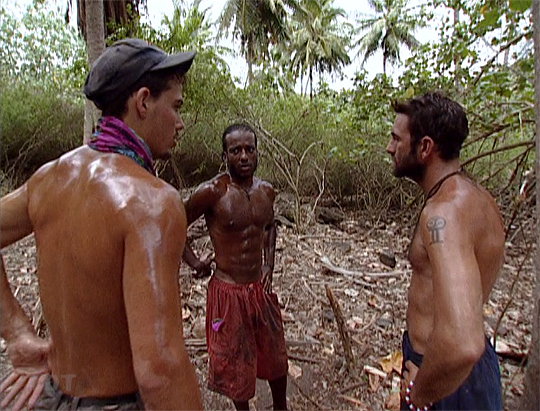

The early conflict of Boston Rob vs. Hunter on Maraamu claimed two more victims in this two-episode span. In the final pre-merge episode, we'd been hearing a lot about Gina's joy at finally being on a tribe with a bunch of people who work hard. Well, that comes to a rather abrupt end, as the three ex-Rotus vote her out. Then in the first post-merge episode, Boston Rob himself is finally toppled, also a victim of too-small numbers vs. a dominant original Rotu group.
In both cases, the key problem is the insipid early-season Survivor insistence on original tribe loyalty. Survivor had come a long way in its first four seasons, but it still had far to go. As a sign of progress, at least we're no longer supposed to be rooting against Richard Hatch's original scheme to game the voting system by simply having a bunch of original tribemates vote as a bloc, which was viewed as "unfair" by a good chunk of the Borneo audience. The next season in The Australian Outback, when it was the "good guys" of Ogakor doing it, flipped audience opinions, but also sort of poisoned the well, and loyalty to original-tribe alliances rapidly cemented itself as the only *fair* way to play.
Two seasons later, here in Marquesas, almost everyone on Rotu seems to be deeply morally offended at even *entertaining* the idea of forming new alliances after the swap, even when they like and get along with their new tribemates. Even alleged villain/ evil mastermind John is only willing to "work with" the three freshly swapped Maraamus until final 7, at which point they would be outnumbered and picked off, obviously. Same thing when the tribes reunite after the merge - the original Rotus who spent time on Maraamu are now at the bottom of the pecking order, shoving the original Maraamus down to places 10 through 8.
"I'm not here to play the game." Gabe insisted, when he realized votes were coming his way in Episode 5. Similarly, Gina refused to talk strategy (with Peter at least) in Episode 1, then in Episode 6, with Maraamu facing a tough Gina-or-Kathy decision, she again refused to discuss the vote before Tribal Council. It's absolutely mystifying that people felt even thinking about playing strategically was somehow morally repugnant, four seasons into this show's run.
It's as if, almost to a person (well, the Rotus plus Gina, maybe minus John and Tammy), everyone believes, "Production put me with this random group of people on Day 1, and consarn it, it would be an act of unspeakable evil for me to do anything to alter that, during this social-strategic game in which only one person can win."
Thankfully, that calculation will finally change in Episode 8. But not before the moral superiority of blind original-tribe faith wheezes its final death rattle, and eliminates the season's first future All-Star.
If they're not playing the game, then you can have your camp life

This season has consistently featured camp life scenes heavily in the opening act. Occasionally it's interspersed with reflections on the previous night's Tribal, or what the next vote might hold. In the latter case, that's usually only if a swap or merge or IC win breaks up an obvious result, like Gina and Kathy forecasting impending personal doom if Maraamu returns to Tribal Council in Episodes 4 and 7, respectively, or Rob knowing the Gabe boot means he's now a dead man walking in Rotu in Episode 6. Modern Survivor's common cold open, showing the tribe that just attended Tribal Council in the previous episode discussing the outcome really only shows up when there's an argument.
The increased camp life focus has been welcome, to a point. Watching the post-swap Maraamus chase crabs or collect crayfish had its charms, but certainly could have been trimmed a bit. (And did we really need crab hunting twice?) The Rotu four relaxing and plotting at their waterfall also gets repetitive, especially when it's the same plan ("Let's stick together!") each time. Maraamu's Ep7 stumbling on an ancient Marquesan burial site near their camp was by far the most interesting scene, and one loaded with ominous foreshadowing for three-quarters of the eventual final four. So to sum up: generally fun the first time through, but familiarity breeds contempt.
Upon further reflection, though, it's clear that the reason why there's room for all this seemingly superfluous footage is two-fold: First, obviously, this was the era before idols and advantages, so there was no footage to be had of people looking in holes in trees, or furtively reading pages of complicated instructions, the repetitive fodder that normally gobbles up a hefty chunk of a modern Survivor episode. And for the most part, we don't miss that: Camp life footage at least has more variety. But the second and more important reason is this: These people are, by and large, not playing the game.
You can count on one hand the people who are: Rob, John, Sean, and Vee. Maybe Kathy, but her version of the "game" is to work constantly so that people see her as valuable, but doing nothing to break up the Paschal and Neleh power couple she repeatedly points out as posing a threat. John's version (having now shed his alliance of loose cannon Gabe) is to sit on his superior numbers and lock down the Rotu Four into their dominant position. Vee's game is to be helpful, avoid confrontation, and build connections to her new tribemates (i.e. a social game). Sean's game doesn't really kick into high gear until Episode 8. In effect, the only person actively seen trying to make moves in the late pre-merge is Rob (more on that below).
So naturally, if everyone else is sitting around camp, comfortable in their majority status or defeated in their minority position, of course you're going to need to devote a 10-minute segment to a bunch of old white people yelling at crabs, telling them they're a "boogerhead!" or "you sorry son of a gun, you!" or whatever. Gol-lee!
Boston Rob vs. Gina: Gameplay polar opposites

For anyone asking, "Why hasn't Gina played again? She seems so nice!" Episodes 6 and 7 perhaps provide the clearest explanation. Compare and contrast their divergent approaches to Survivor when faced with a likely elimination.
Gina, outnumbered 3-1 by original Rotus on Maraamu, repeatedly refused offers to discuss strategy as her tribe faced Tribal Council in Episode 6. Unsurprisingly, she was then voted out, 3-1. Boston Rob faced a similar fate in both episodes. He spearheaded Rotu's immunity win in Ep6 to avoid Tribal, then in the next episode, after falling short in the first individual IC, tried his best to talk to/ yell at every single person in Soliantu camp. It wasn't effective, but you can't fault the effort.
Players like Gina—who placed morality and integrity (basically: only hard workers "deserve" to win) and sticking to one's priniciples above any kind of strategy or deal-making—have thankfully fallen by the wayside as the show has evolved. They still pop up from time to time, usually among obvious recruits and/or people with celebrity reputations to protect. It's great that they hold these views in real life, but this is Survivor. It's not that entertaining to watch an otherwise nice person meekly accept their fate when down 3-1, and instead talk exclusively about food.
Rob's regrettable post-swap comments notwithstanding, at least he's playing the game, trying to shake up ossified power structures, find a crack, exploit an angle. He's active participating. (He's also doing it completely wrong, and his disdain for Vee's "kissing up" to everyone in the merge episode is pretty amusing, considering where the two of them end up this season.) If not for the show actively seeking out more aggressive players like Rob, Survivor probably wouldn't have lasted 40 seasons.
Still, it's interesting looking back at this original version of Boston Rob now, post-Winners at War. Latter-day Boston Rob became exactly the kind of inflexible, loyalty-touting player that he railed against here. He spends Episodes 4-7 here complaining at length about how he can't crack the impenetrable Rotu alliance. But his win in Redemption Island came by creating an even more inflexible, unbreakable original tribe alliance. John Carroll's Rotu Four on steroids.
Also, John actually did offer Rob a deal to stay (post-swap) Rotu strong after the merge, but Rob went and screwed that up by blabbing everything to Kathy. Not only that, but Rob insisted on confronting Kathy and Zoe together, trying to force Zoe to admit she had lied about the Rotus' plan to target Kathy first. Tactically, this was an outside-the-box move that was effective in undermining Kathy's trust in Zoe. Strategically it was a disaster, though, because there was zero chance Zoe would not report Rob's double-dealing back to John. So it made perfect sense for John to stick with Pascal/Neleh and maybe Kathy, over a demonstrably unreliable Rob/Sean/Vee group. (It's not clear what Rob's master plan was here: Flipping Kathy only gave him four, and he made no visible attempts to recruit Paschal and Neleh himself. Given that he had to go to such extreme lengths to convince Kathy, even after spending 24 hours with her, well-fed and drunk, it suggests he had zero chance of flipping the other two. Kathy *might* have been able to help sway them, but that's a long shot.)
Fast forward 18 seasons, and Redemption Island Boston Rob refused to let any of his Ometepe tribemates talk to Zapatera, not even so much as a high-five after a challenge. He set up a buddy system to enforce compliance with this clampdown. He won, of course, but it was basically Rotu dominating Maraamu all over again, minus the (Marquesas Episode 8) power shift. Winners at War Rob hadn't seemed to have changed much. He demands loyalty above all, but remains personally exempt from those same rules. Still, he's rightly a key player in Survivor history. His gameplay in Marquesas definitely moved the meta-game forward, and two years later, he provided a memorable blueprint for near-success in All-Stars. But the game kept moving after he left. Voting blocs? *Boston Rob shudders*.
As a side note, it's fascinating how much Rob's first-season game here resembled the debut of his eventual Redemption Island nemesis, Russell Hantz, in Samoa. Doing little to help around camp? Check. Privately calling all his tribemates "morons"? Check. Aggressively confronting other players, to throw them off balance and expose their plans? Also check. Could Rob have won if he'd made it to the end in Marquesas? It's hard to say for sure. He would have had his work cut out for him mending hurt juror feelings. Chances are fairly good that he would have fallen short, just like Russell. And just like All-Stars Boston Rob.
 Jeff
Pitman is the founder of the True Dork Times, and
probably should find better things to write about than
Survivor. So far he hasn't, though. He's also responsible
for the Survivometer, calendar, boxscores, and contestant
pages, so if you want to complain about those, do
so in the comments, or on twitter: @truedorktimes
Jeff
Pitman is the founder of the True Dork Times, and
probably should find better things to write about than
Survivor. So far he hasn't, though. He's also responsible
for the Survivometer, calendar, boxscores, and contestant
pages, so if you want to complain about those, do
so in the comments, or on twitter: @truedorktimes
ADVERTISEMENT